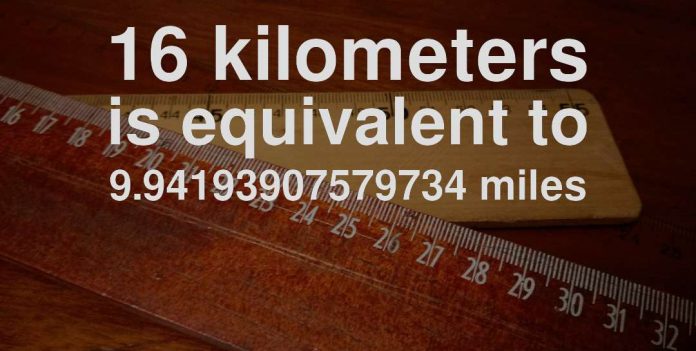Conversion of 16km to miles

The conversion from kilometers to miles is a common conversion used when comparing distances in different units of measurement. One kilometer is equal to 0.621371 miles, so to convert from kilometers to miles, you can use this conversion factor.
Here’s an example: If you have a distance of 10 kilometers, you can convert it to miles by multiplying it by the conversion factor:
10 km x 0.621371 miles/km = 6.21371 miles
So, 10 kilometers is equal to 6.21371 miles.
It’s important to note that the conversion factor is an approximation and is not always exact, so the result may have some rounding error. Additionally, depending on the level of precision needed, a more accurate conversion factor can be used.
In summary, converting kilometers to miles involves multiplying the distance in kilometers by the conversion factor of 0.621371 miles per kilometer.
Kilometer (km) is a unit of length used to measure distances and lengths. It is part of the metric system, which is used in many countries around the world. One kilometer is equivalent to 1000 meters, and is roughly equivalent to 0.62 miles.
The kilometer is a convenient and easily understandable unit of length, making it useful for a variety of purposes, such as measuring distances between cities, the lengths of roads and highways, and the distances of various athletic events, such as running races.
The use of kilometers has become widespread due to the adoption of the metric system by many countries, and the standardization it provides. This has allowed for easier comparison and exchange of information between different countries and regions, and has made it easier for people to understand distances and lengths in different parts of the world
Mile is a unit of length used to measure distances and lengths. It is primarily used in the United States and its territories, although it is also used in a few other countries. One mile is equivalent to approximately 1.609 kilometers.
The mile has its origins in the Roman Empire, where it was defined as the distance a person could walk in 1,000 paces. Over time, the definition of the mile has changed, and it is now standardized as 1,609.344 meters.
The use of miles has been widespread in the United States and its territories, and is still commonly used today for a variety of purposes, such as measuring distances between cities, the lengths of roads and highways, and the distances of various athletic events, such as running races.
Despite the increasing use of the metric system around the world, the mile remains an important unit of length in the United States and continues to be widely used and understood by many people.
How to convert 16km to miles?
Converting 16 km to miles is a straightforward process that requires simple arithmetic. One kilometer is equal to 0.621371 miles, so to convert 16 km to miles, we simply multiply 16 by 0.621371. The calculation would look like this:
16 kilometers x 0.621371 miles/kilometer = 9.946976 miles
So, 16 km to miles is equal to approximately 9.946976 miles.
It’s important to note that this conversion factor is only an approximation, and there are more precise conversion factors available for specific purposes. However, the conversion factor used here is sufficient for most general purposes, and it provides a good estimate of the number of miles in a given number of kilometers.
In conclusion, converting 16 km to miles is a simple process that provides a quick estimate of the distance in miles.
What is the use of measurement?
Measurement is the process of determining the size, amount, or degree of something. Measurement plays a crucial role in many aspects of our lives and is used for various purposes, including:
Science: Measurement is essential in scientific experiments, as it provides a way to quantify and compare results. Scientists use measurements to determine the properties of matter and energy, the laws of nature, and to test hypotheses.
Technology: Measurement is used in the design and development of new technologies, as well as for quality control in manufacturing and engineering. For example, measurements are used to determine the size and shape of components, to ensure that they meet specified standards.
Medicine: In medicine, measurements are used to monitor health and diagnose diseases. For example, doctors measure height, weight, blood pressure, and other vital signs to assess a patient’s health.
Cooking: In cooking, measurement is used to determine the amount of ingredients needed to prepare a dish.
Daily life: Measurement is used in everyday life, such as measuring ingredients for recipes, determining the size of clothing, or determining the distance between two points.
Overall, measurement is a fundamental tool that plays a vital role in many areas of life, providing a way to quantify and compare things in a meaningful and standardized way.
For more blogs: Fixnewstips
What is the need for conversion of measurement?
For example, a scientist may use meters to measure length, while an engineer may use inches, and a tradesperson may use feet. Without a proper conversion of measurement, these professionals would have difficulty communicating and working together effectively. This can lead to errors, misinterpretations, and inefficiencies in various applications. Conversion of measurement is crucial in ensuring that all measurements are made in a common unit of measurement, allowing for accurate and meaningful comparisons. This allows professionals from different fields to communicate and collaborate effectively, resulting in efficient and effective use of resources. In the field of science, conversion of measurement is critical for accurate data collection, analysis, and interpretation. It helps ensure that all measurements are consistent and comparable, allowing scientists to draw meaningful conclusions from their experiments. In engineering, conversion of measurement is necessary for effective design and construction, as engineers need to be able to accurately calculate and convert various dimensions and quantities.
Need for conversion of measurement is fundamental to ensure effective communication and collaboration in various fields, as well as to promote accuracy, efficiency, and consistency in data collection, analysis, and use.


